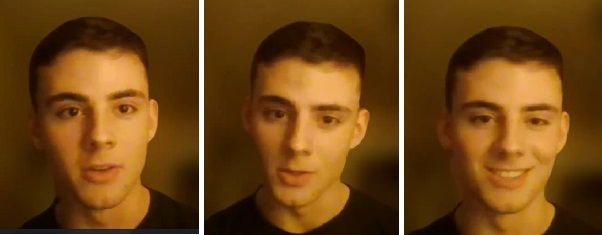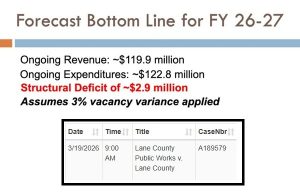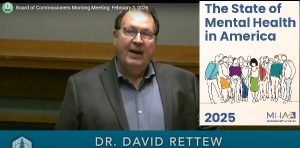UO advances Center for Human Rights, partners with city to benefit community
7 min read
Presenter: The University of Oregon is establishing a multidisciplinary Center for Human Rights, and hopes to partner with the city’s Human Rights Commission to benefit the whole community. At the HRC Feb. 18, Charlie Petrik:
[00:00:14] Charlie Petrik: I’m a senior at the University of Oregon studying global studies and geography. And I’m working alongside another student named Sophia Barghouti. We’ve been working tirelessly over the past six or seven months to address gaps in what the University of Oregon offers surrounding human rights education, discussion facilitation, and applied learning on campus.
[00:00:35] We’ve really identified a situation where coming out of last year with a lot of strife on campus around Israel and Gaza and students from both sides feeling like they weren’t heard, realized that the University of Oregon lacks significant opportunity for free inquiry, the basic tenet of a university, you know, facilitate the discussions, questions about: What are human rights? How are they operationalized? How are they put into practice? Not only just in our community, you know, we’re dealing with so many human rights issues here at home, but also globally for students of multidisciplinary interests.
[00:01:06] So we’ve been working over the past six months. We got the support of our student government, multiple different faculty—we’re talking School of Design, journalism/communication, and education, global studies, political science, really embracing this multidisciplinary aspect.
[00:01:19] And just last week, we gained the support of our provost, Dr. Chris Long, to put together a task force that will work over the course of the next year in order to establish a Center for Human Rights at the University of Oregon, which is great news—expanding experiential learning opportunities for students to work not only abroad, nationally, but also locally, and then also expanding the ability for students to engage in free inquiry and discussion surrounding human rights and what those concepts are.
[00:01:46] So, I’m here to present our proposal that we put forth last week, seek support from the Human Rights Commission, and hopefully set the grounds for continued collaboration. We think it’s critically important that the Center works alongside the community, works with the community, provides opportunities for students to engage with the community.
[00:02:03] We know that that is a huge, huge priority of the current administration of the University of Oregon right now is to increase community engagement, specifically surrounding human rights issues. So we’re hoping that this sets the ground for continued conversations, input from the Human Rights Commission regarding the structure, and hopeful opportunities for collaboration going forward.
[00:02:23] Presenter: He said launching the Center will take at least three to five years. Charlie Petrik:
[00:02:28] Charlie Petrik: Centers take a little while to get their feet in the ground at the University of Oregon. And so we’re hoping that within the next five years, ideally what our vision is, is to have students have internship opportunities to be able to communicate directly with the Human Rights Commission regarding their interests, specifically in the work that you all are doing with hate crimes reporting and community monitoring, which is critically important for human rights monitoring at the local level and to continue that partnership.
[00:02:54] I think student energy and support is so, so critical. There’s a lot of students who can do a lot of work, groundwork in the community. There’s also a lot of support for students from the University doing that work to go out into the community and do so. You know, we have this constituency of budding professionals who are really interested across disciplines in human rights. And hopefully, they can contribute to the crafting of policy, the crafting of change-making policy at the local level, the ability to analyze reporting, analyze policy coming out of it. These are just ideas.
[00:03:26] But we really think that the student body isn’t mobilized in the direction of the community. And that’s an issue, because a lot of students are interested but they don’t know how to get involved or might not have the connections to, or might not even know that there is a pathway for them within the Eugene community to do work on human rights.
[00:03:41] People look abroad, people look nationally at the federal government level. And right now that’s threatened. And so there really is a need for community engagement. And we think that this is a good way for students to get involved and really bring the skills that they have over the four years that they’re here and contribute to the community and give back to the community that’s given so much to them.
[00:04:01] Presenter: Human Rights Commissioner Dr. Silky Booker:
[00:04:04] Dr. Silky Booker (Human Rights Commissioner): Thank you for being here. I definitely like your proposal.
[00:04:07] I read through some of it, one thing that I really noticed is there’s not a lot of Black organizations affiliated with this, which concerns me. I’m all for it. Advicewise, I guess, my two cents is building relationships with Black fraternities, the Lillye Reynolds (Parker) African-American Cultural Center, Black student-athletes, the Black student alumni.
[00:04:28] I know for sure that these organizations would love to be a part of the forming of this. I don’t know how many Black professors you have on here it doesn’t identify, but I don’t see a lot of Black student organizations, and I think that’s really super important that you build relationships with these Black organizations and get them on board with the initial creation of this. The University makes millions off of Black student-athletes. I mean, the University wouldn’t even be there if it wasn’t for the Black student-athletes that come through the University, so I would like to definitely see more Black student-athletes a part of this.
[00:05:05] And I’m a futuristic type of person, visionary. I see this as being something that would be very good to sustain a relationship that hasn’t existed between the University of Oregon and the community here. A lot of times when I speak to Black athletes, they don’t even realize that there’s a Black community here. Well, this will be a good introduction to letting the Black student population know that there is an organization that they can come to and communicate with.
[00:05:32] I even see this possibly, you guys having a liaison on our board and we having maybe one or two liaisons on your board. That would bridge the relationship, I think, drastically, especially in you guys understanding what’s going on in the community surrounding you.
[00:05:50] We get a lot of complaints. We get a lot of reports that you guys aren’t privy to. I’m pretty sure vice versa, but it would be good to stand in solidarity with another human rights commission on the University.
[00:06:04] Presenter: Commissioner Kianna Cabuco:
[00:06:06] Commissioner Kianna Cabuco: I really appreciate this proposal and I agree that it would be a really great idea for us to support it. I also really appreciate your outlook in trying to include the community, ’cause I completely agree and that’s something that I have been trying to work on in many varying capacities is the connection between the University and the community at large and how we’re going to keep some of these young professionals like you said that are coming out of this huge university in our area. We see a lot of them leaving and I think you’re right, they don’t know what’s in the area, they don’t know the opportunity that’s here. And I would love something like this to be on the HRC and the city’s radar. And if there’s even, like, further development in some kind of community plan coming from this would be great.
[00:07:05] And, like, how to integrate: I second Dr. Booker’s suggestion of maybe seeing if there’s somehow we can have a liaison on the HRC or just having someone a little bit more involved at the city level. I would also recommend making sure you’re involved in Springfield as well.
[00:07:22] But yes, I love this idea. I love the idea of integrating the community and the University. And I think that you would have a lot of willing players if you just know exactly where to reach out to. And I would be happy to connect outside of this as well.
[00:07:39] Charlie Petrik: Yeah, absolutely. Thank you so much, all of you, for the great questions and your willingness to engage in this type of way. And as I leave the University, I just only hope as an Oregonian and also as a Eugenian now myself, I hope that this continues to grow and flourish in a way that’s best for both groups. So I really appreciate it and look forward to continuing this partnership.
[00:08:01] Presenter: Graduating senior Charlie Petrik helps launch a collaboration between the city’s Human Rights Commission and the forthcoming Center for Human Rights at the University of Oregon. The UO administration hopes to create a stronger relationship between the University and its community.






